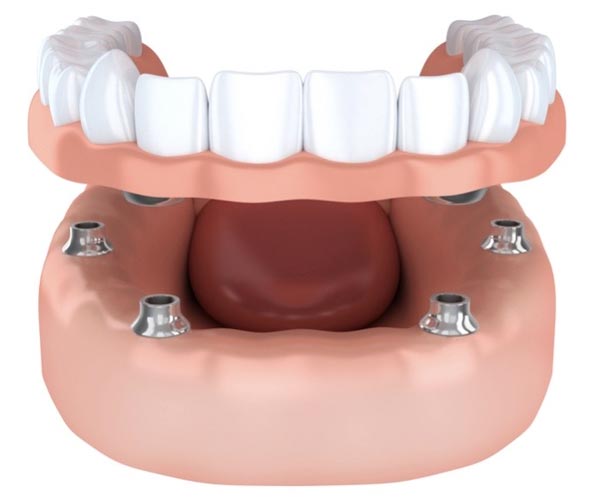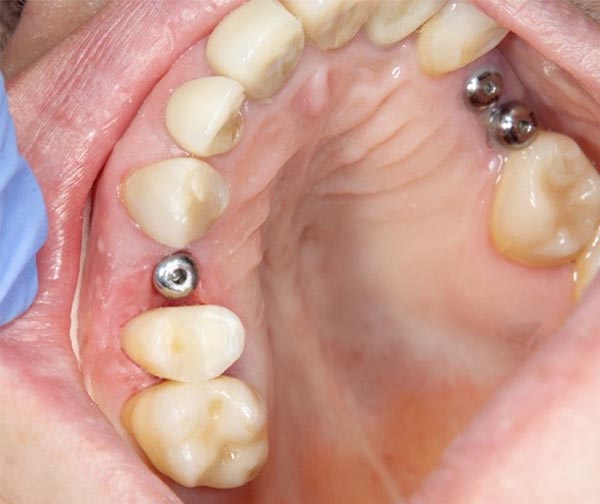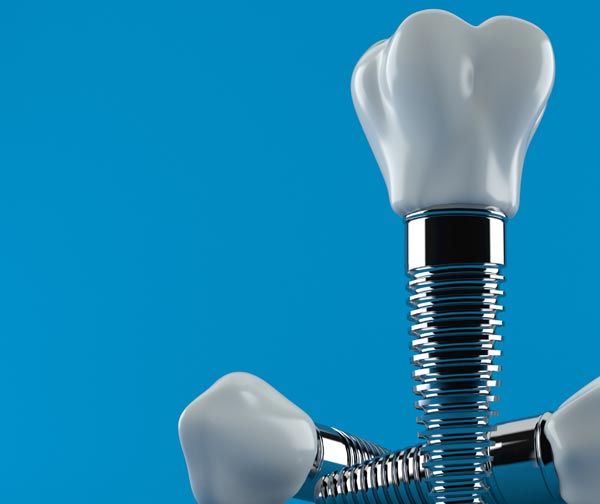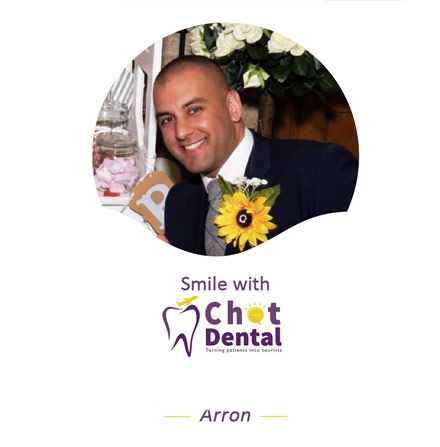What is a dental implant?
Dental surgeons have performed tooth implants to replace missing teeth for over 50 years, and has become much more popular in recent years. Dental implants can be used to support crowns replacing single missing teeth, bridges that restore a larger span of missing teeth, or even dentures. Implants are manufactured from titanium, a metal that is known to be compatible with body tissues and able to bond with adjacent bone during healing.
A dental implant is a titanium screw that can be inserted into the jawbone in place of a lost tooth or teeth, merging with the bony tissue to serve as a natural tooth root. The procedure is performed under local anaesthesia without the patient feeling any discomfort.
Three parts to dental implant:
1.Implant - a threaded titanium implant inserted into the tooth socket
2.Abutment - a post is attached after the healing of the site
3.Crown - attachment of the new permanent tooth.
We use the most advanced technology (Tomography 3-D), to measure the patient’s bone to assess what implant actions are required. The A-grade dental implants we use come from international brands, manufactured in Switzerland, Germany, Korea, Sweden and USA.

Unlike crowns and dentures, an implant has a number of advantages over conventional crowns, bridges and dentures.
- Allows for better speech and chewing functions
- Improves appearance by keeping the contours of the face looking more natural
- Implants look and function in the same way as natural teeth and with no difficulties eating or cleaning the teeth
- Healthy adjacent teeth do not have to be filed down to act as supports for the missing tooth or teeth. This means that they are therefore less likely to need root fillings
- The presence of the implant maintains the structure of the bone beneath the replaced tooth, as chewing forces are transmitted through the implant to the bone and stimulates the natural process of bone renewal. This helps preserve a good appearance, both of the restored teeth and of the face
- Dental implants can be used to give removable dentures a firm grip. With dental implants, there is no requirement for glues to hold the false teeth in place, as there is with some dentures

Are dental implants suitable for everyone?
A dental implant is suitable for anyone whose general health is good, with no upper age limit. However, they are not suitable for very young patients who have not yet completed their bone development. Implants come in a specific thickness and width and as such the jawbone must have a height and width that will allow the implant to be fitted.
Also, another factor is the quality of bone which affects the success of a dental implant which is adversely affected if the bone is too hard or too soft. Attention to the gums and adjacent anatomic structures are important for the insertion of dental implants. This treatment can be performed after bone development has been completed which is around 18 years of age.
As a general guideline, at least 1 mm of bone is required around a dental implant. More space is required when the implant is next to a tooth or another implant (2 and 3 mm respectively). If there is not enough bone to completely envelope the implant, a bone graft will be required.
What to Expect from Bone Grafting for Dental Implants
Dental implant surgery is generally performed in stages. First, the damaged tooth is removed if it has not already been. Then the jawbone is prepared for surgery. It is at this stage, bone grafting may be required. A bone graft is a procedure that replaces and also regenerates lost bone, and can restore facial contour. If teeth have been lost due to trauma, decay or injury, some bone loss often occurs and the bone around the jaw will start to deteriorate. A bone graft creates a more solid base for a dental implant if this is the required.
About Bone Grafting
Today options include obtaining bone from a cadaver source or an animal source to replace the missing bone. These options provide less morbidity to the patient, prevents a second surgical site, and are just as successful. After this process, it may take 6 months for the transplanted bone to grow enough new bone to support the actual placement of a dental implant. Once the jawbone does heal, the implant process moves forward.
Post Bone Graft Procedure
While time-consuming, bone grafts can be an essential and necessary part of any implant process. After surgery, patients may experience typical discomfort, such as gum or skin swelling or bruising and minor bleeding, but these common side effects dissipate quickly. There are also some diet restrictions, such as only being able to consume soft foods while the mouth heals, following each stage of the bone graft and implant procedure.
If you are having implant treatment you will be required to make at least 2 visits to our clinic. The first visit takes up to 7 days and after 4-6 months having passed, return for the second visit which may take up to 14 days. We recommend assessing a full mouth X-ray from your local dentist before travelling for treatment.
How many teeth can be replaced with dental implants?
There is no limit to how many teeth can be replaced in a healthy mouth however not every tooth requires an implant, if several teeth need replacing, a bridge between implants is generally recommended.
There are various options available with dental implants, we can replace a whole arch, a row of teeth and even a complete set of teeth. If a patient has lost all of their upper teeth, they would generally need 6–10 implants inserted into the upper jaw.
What do you need to know about dental implants?
For the patient considering dental implants, there are four things they need to know:- It is estimated Dental implants have a 95% success rate but this varies depending on the capabilities of the dentist, the patient’s health, and which part of the jawbone the implant will be placed.
- Dental implants, with crowns attached, appear identical to the patient’s natural teeth and feel like they are real.
- Due to the fact the dental implants are anchored into the jaw, eating is easy with no difficulty or discomfort and no slipping, sliding or falling as with standard dentures.
- When the root of a tooth is missing, the jawbone gradually loses bone mass and density – this happens with standard bridges and dentures. Implants serve as a replacement tooth root with the titanium screw acting as a faux tooth root. The jawbone is coerced into thinking that the tooth root is still there, and begins to grow new tissue around it, preventing the jawbone from deteriorating.
Dental Implants do not need the aid of healthy teeth to affix a dental prosthesis – the bridges, crowns or dentures can be secured to the titanium implant itself without interfering with the other healthy teeth.
Benefits of having teeth implant treatment?
- Looks and feels like a natural tooth
- Aesthetically pleasing
- No possibility of tooth decay
- Easier to clean
- Implant over-dentures offer for better chewing and speaking functionality
- A missing tooth can be fixed in place without affecting adjacent healthy teeth
- Prevents bone loss and gum recession
- A complete set of dentures supported by implants improves quality of life.
- Treatment in Turkey is up to 80% cheaper
After implantation
Most patients generally return to their normal everyday life on the same day of surgery. It will be necessary for the patient to wait between 4-6 months for the bone to grow around the implant before attaching the final crown/bridge or denture.
Will I feel any discomfort?
Due to anaesthetic being administered (as with most dental procedures) you should not feel much discomfort. You may however feel a slight ache after the implantation (similar to that after a tooth extraction), and this may be relieved with a simple analgesic.
Are implants durable?
If a correctly selected dental implant is properly inserted, and the patient practices good oral hygiene then the implant could remain in the mouth problem free for many years. Quality of the dental implant is important. In our clinic we use the highest quality dental implants manufactured in Switzerland, Germany, Korea, Sweden and USA.
Are dental implants likely to fail?
Implants can fail. The dentist will assess the patient’s general health while also assessing the implant insertion site prior to starting the procedure.
The success rate for dental implants is lower in individuals that smoke, and/or who do not take the necessary care of their oral hygiene.
If the patient takes the necessary oral care, dental implants can last for many problem free years.
Risks
- Infection at the implant site
- Injury or damage to surrounding structures, such as other teeth or blood vessels
- Nerve damage, which can cause pain, numbness or tingling in your natural teeth, gums, lips or chin
- Sinus problems, when dental implants placed in the upper jaw protrude into one of your sinus cavities





